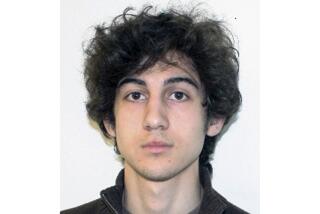Investigators cast wider net in Boston bombings
- Share via
WASHINGTON — The FBI has found female DNA on at least one of the two homemade bombs detonated during the Boston Marathon on April 15, complicating the task of identifying how and where the deadly devices were constructed.
The presence of genetic material does not necessarily mean a woman helped build the pressure-cooker bombs that killed three people and injured more than 260 others, said a law enforcement official, who discussed the discovery on condition of anonymity because the investigation is ongoing.
The genetic material could have come from a woman who was in the room where the devices were built, or from a cashier at a store where one of the bomb parts was purchased, the official said.
PHOTOS: Boston Marathon bombings
Still, the test results have prompted investigators to look more closely at women who may have had contact with the alleged bombers, Tamerlan Tsarnaev and his younger brother, Dzhokhar. Investigators are collecting DNA samples from some women who were close to the pair to provide a comparison.
On Monday, investigators visited the Rhode Island home of the family of Katherine Russell, the widow of the elder brother, who was killed in a shootout with police on April 19. Dzhokhar Tsarnaev was wounded but captured, and faces federal charges of using a weapon of mass destruction.
Investigators are also casting a wider net for others who may have been associated with the alleged bombers, both in the U.S. and in Russia, where the suspects’ parents lived in the southern republic of Dagestan.
The Russian newspaper Novaya Gazeta quoted a Russian law enforcement source as saying that during a six-month visit to Dagestan in 2012, Tamerlan Tsarnaev was seen “more than once” meeting with Makhmud Mansur Nidal, suspected of being part of a rebel group that previously had planted two bombs in the Dagestani capital of Makhachkala.
The Tsarnaev brothers’ troubled trail to Boston
Nidal, who was of joint Palestinian and Dagestani extraction, was killed May 19, 2012, when Russian authorities laid siege to a house where he and six other suspected insurgents were holed up, a Dagestani Interior Ministry official told the Los Angeles Times.
Novaya Gazeta reported that Russian agents also discovered that Tsarnaev had some online communications as early as 2010 with William Plotnikov, then 21, a Canadian citizen and Russian native who, like Tsarnaev, was a boxer. He had been living in the Toronto area with his family since 2005.
Plotnikov traveled to Dagestan purportedly to study Islam, but was one of eight people identified as insurgents killed by law enforcement forces on July 14, 2012, in one of Dagestan’s remote mountain villages. Two days later, Tsarnaev left Dagestan for Moscow; a day after that, he left for the U.S., without waiting to receive the new passport that Russian officials have said was one of the purposes of his trip.
Russian authorities said they had documented no connections between Tsarnaev and either of the two suspected insurgents. “We have no information tying the two with Tamerlan Tsarnaev,” the Interior Ministry official said.
In the U.S., investigators appear to have questioned a man known as Misha previously named by Tamerlan Tsarnaev’s family as one of those who influenced his increasingly strict adherence to Islamic teachings.
Mikhail Allakhverdov, a 39-year-old resident of Rhode Island, told a writer from the New York Review of Books that FBI officials had examined his computer and telephone as a result of his friendship with Tsarnaev but did not appear to be interested in pursuing the inquiry further.
“I’ve been cooperating entirely with the FBI. I gave them my computer and my phone and everything. I wanted to show I haven’t done anything. And they said they are about to return them to me. And the agents who talked told me they are about to close my case,” Allakhverdov, whose nickname is Misha, told the writer.
He insisted he knew nothing about the bombings, and also said he had no role in teaching the Tsarnaevs.
“I wasn’t his teacher. If I had been his teacher, I would have made sure he never did anything like this,” he said.
Bennett reported from Washington, Murphy from Seattle and Loiko from Moscow.
More to Read
Sign up for Essential California
The most important California stories and recommendations in your inbox every morning.
You may occasionally receive promotional content from the Los Angeles Times.














